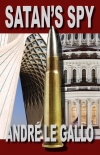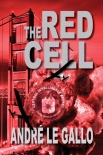The Caliphate by André Gallo (booksvooks .txt) 📗

- Author: André Gallo
Book online «The Caliphate by André Gallo (booksvooks .txt) 📗». Author André Gallo
Second, he would present the use of technology in keeping track of insurgents and terrorists through ground sensors and Unmanned Air Vehicles. And third, Steve had learned that the FAR were planning major relocations of their bases away from the cities to the less developed areas of the country. West Gate had a track record of helping establish new bases in Iraq and of moving old ones in the United States. West Gate could offer people with hands on experience in all of these areas. Steve was convinced that West Gate could add value to Morocco’s military capability and that Morocco’s 1.3-billion-dollar defense budget could add value to West Gate’s bottom line. Steve could already see himself into a new corner office.
***
Steve went out to see the city before leaving for his first appointment. The taxi took him by his old house, his school, and eventually left him off at the Salé medina. Salé had been a homeport to Barbary Coast pirates in the eighteenth century and now offered the best shopping in Rabat.
A water-seller with bare legs, sandals, a short tunic with red and gold fringes but no sleeves and a large flat hat in several colors from which small bells hung, was trying to attract customers at the entrance to the medina by ringing a bell he held in his hand.
Steve went by this Moroccan Harlequin as someone made a purchase. Harlequin unhooked a brass cup from several hanging from a bandolier across his chest and filled it with water from a water skin hanging from one shoulder. Steve entered a narrow alley lined with stalls.
He wandered through the alleyways of the small Salé medina. He stopped to watch an artisan chiseling intricate geometric designs on a round brass tray. He could see several finished products hanging in the shop and bought one, after a bout of rigorous and expected bargaining. Farther on he started to bid for a handmade Rabat rug, blue designs in the center on a field of red that would have to be shipped. But it was getting late. He suspended the negotiations and went back to his hotel.
Once in his room, he wanted to check his PowerPoint one more time and went to his laptop. It had been turned off for the last two hours but was surprisingly warm to the touch. Concerned, he quickly went through the password and thumb-print identification procedure and satisfied himself that his presentations were still there. It seemed unlikely that the hotel maid had been surfing the Internet or that she could even get through his biometric security software.
He returned to his dresser and wished that he had paid more attention when taking fresh clothes from the drawers. He couldn’t be sure but, on closer inspection, he thought his clothes were not as he had arranged when taking them out of the suitcase. He had brought brochures to leave behind after his meetings and, on checking them, was sure someone had been through them; they were definitely out of order.
He found no other suspicious indications but wondered whether he should have “trapped” drawers and doors as he had seen in the movies. Nothing had been stolen, as far as he could tell. He was annoyed that one of his father’s stories forced itself on him. From his service in Romania, he had concluded that if a surreptitious visitor has taken nothing, it is most likely that he has left something behind. He started looking for microphones, half-heartedly and self-consciously, a bit embarrassed. Wasn’t this just another of his father’s rules? Still, he felt uneasy.
***
The next day, Steve walked out of his hotel toward the center of town and went into a shop. Several singletons came in after he did—two men and a woman. None paid attention to him. He went out, walked two blocks to another shop and again observed people who came in shortly after he did while ostensibly looking at the merchandise. None was a repeat. He figured the people he was looking for were probably young men, which allowed him to eliminate seventy-five percent of his possible surveillants thus far.
He went to one more shop and he had a repeat, a young Moroccan in sunglasses, a New York Yankees t-shirt and Nikes, easy to remember. He then took a cab to the Mausoleum of Mohammed V, the monarch in power when Morocco became independent in 1956. There he told the driver to wait, and went up the marble steps of the white crenellated mausoleum, past a guard in red with a white cape, black boots, and a green fez.
The guard’s rifle looked very much like an M-1, the U.S. Army’s primary infantry weapon in World War II and Korea. As a member of Lehigh’s rifle team, he had seen but never fired the weapon. He wondered if that was the vintage of the average FAR weaponry. At the top of the steps, he looked back at the surrounding ruins of the old mosque on which the mausoleum was built and noticed New York getting out of a cab in back of the one he was still using. New York had a friend, same age, about twenty-five, also slight of build but at least five-feet, ten.
Steve concluded that the unwanted attention was not a mugging in the making. They didn’t seem threatening; they apparently just wanted to keep him in sight. He cut short his surveillance-detection, went back to the hotel to pick up his briefing materials, and headed for the Ministry positioning himself in the back seat so as to keep his eyes on the cab’s rear and side view mirrors. A white Fiat shepherded him from the hotel to the Ministry.
He arrived early for his meetings and drank more sweet tea than he really wanted while he waited. He sensed a changing attitude for the better





Comments (0)